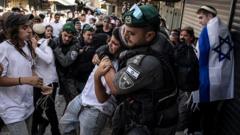Tensions soared in Jerusalem as nationalist groups clashed with Palestinians amidst the annual Jerusalem Day, creating a violent scene that drew condemnation from political leaders and observers alike.
Far-Right Violence Erupts During Jerusalem Day Celebrations as Tensions Rise

Far-Right Violence Erupts During Jerusalem Day Celebrations as Tensions Rise
Far-right activists in Jerusalem clash with Palestinian residents during annual commemorative parade, provoking widespread outrage.
Crowds of far-right Israelis, chanting incendiary slogans, clashed violently with Palestinians during the Jerusalem Day parade on Monday, marking the Israeli annexation of East Jerusalem following the 1967 Arab-Israeli war. The event has sparked significant outrage, with politicians and observers labeling it a festival of "hatred and racism."
The spectacle unfolded primarily at Damascus Gate, a central entry point to the Old City, where thousands of right-wing activists gathered. From there, disturbing chants echoed throughout the streets, including calls for violence against Arabs. Opposition leader Yair Lapid criticized the event, asserting that it reflected a deep-rooted culture of hate that runs counter to the principles of Judaism.
Israeli police intervened as confrontations escalated, arresting several participants who engaged in violent acts, including harassment towards Arab traders in the area—many of whom were still conducting business when the unrest began. Left-wing opposition figure Yair Golan described the scenes as an embodiment of "hatred, racism, and bullying," calling for Jerusalem to be a shared city for all its inhabitants.
The events coincided with a broader context of escalating violence in the region, particularly due to Israel's ongoing military operations in Gaza following a deadly confrontation with Hamas earlier this month. Israeli Prime Minister Benjamin Netanyahu reaffirmed the government's commitment to maintaining Israel's sovereignty over Jerusalem, asserting the significance of the city to the nation's identity.
As clashes continued, Nabil Abu Rudeineh, a spokesperson for the Palestinian presidency, condemned the march along with Right-Wing National Security Minister Itamar Ben Gvir's provocative visit to the Al-Aqsa mosque compound, stating that such actions jeopardize regional stability.
Despite the turmoil, the march concluded at the Western Wall, the holiest site for Jewish prayer in Jerusalem, with a large Israeli flag unfurled—symbolic of the contentious and complex identity of the city. The longstanding historical and political implications of the Jerusalem Day parade continue to illustrate the deep divides between Israelis and Palestinians, particularly in light of the ongoing humanitarian crisis in Gaza, where civilian casualties have reached alarming numbers since the onset of hostilities.



















